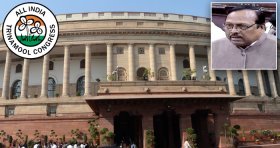July 18, 2018
Sukhendu Sekhar Roy speaks on Immovable Property (Amendment) Bill, 2017

FULL TRANSCRIPT
In this Bill, it has been proposed to amend Section VII of the Act to enable the Central Government to reissue the notice of acquisition to the owner or such other person interested in the property for the purpose of giving opportunity of being heard.
Now, the preceding paragraph, in the ‘Objects and Reasons’ section, it has been said that there have been instances of persons interested in requisitioning property, challenging the notice of acquisition on the ground that the same has not been published without affording personal hearing to them. Thereafter, the interested person or persons have challenged the award for the order in the court of law and some of the cases went up to the Supreme Court. So during this prolonged period, the prices of the properties increased and therefore the quantum of compensation payable to the person or persons should also be enormous. That is why the Government has said that notwithstanding any order of any court, the Central Government seeks to have the right to reissue a notice.
Sir, as a lawyer you also know that if a person is not given the opportunity of being heard, it is a denial of the principle of natural justice and it contravenes Article 14 of the Constitution of India. So in that case the person or persons have the right to challenge the decision of the Government in a court of law. And if a court sets aside that notification, then that person is entitled to get the compensation as will be awarded by the court. But here the Government has sought to have the power, whether there was any opportunity given to the person or not for a hearing. So after prolonged litigation, if the person again has to come to the authority for hearing, and after that the authority has to decide the quantum of compensation, it is, I think, illogical, irrational and also illegal.
Sir, here you have particularly mentioned “further it is proposed that any enhanced compensation with or without interest by the court or other authority before the date of the commencement of the proposed Amendment shall be the subject to the reissuance of the proposed requisition and shall be applicable only to the cases of property be it acquired for national security or legal purposes.”
So… only in cases of acquisition or property involving national security and defence security… what about the other properties? Suppose the properties which have been acquired for railways, or for national highway or for airports or for any other purposes then there will be two sets of arrangements, two sets of scheme of law, this is also highly objectionable, Sir, according to me.
If the Government wants to have a general principle, a general rule to follow then it should be made applicable in all cases. Why is there discrimination between one set of people and other set of people? I am fortunate or unfortunate because my property has been acquired for the purpose of defence or national security and the other group of people are fortunate or unfortunate if that objective is not involved in their property in national security or defence purposes.
Therefore, Sir, this is absolutely discriminative in the eye of law. I would request the Government to relook and revisit this provision. Without this matter being discussed in a Standing Committee of the Parliament, this Bill should not passed.
That is my submission to the Government, through you, Sir.
Sukhendu Sekhar Roy seeks clarification on Immovable Property (Amendment) Bill, 2017
Sir, I have only one clarification from the Hon Minister and I would urge upon the Minister to think over the issue very seriously, not to be agitated upon. It is a very important issue. It is said that the owner of the property shall also be entitled to annual rate of interest prevalent at any relevant time on the compensation payable on the date of publication of first notice.
Suppose in a given case, the first notice was issued in the year 1960. After prolonged notification, when the second notice has been issued, or reissued, then, whether it confronts – you are paying at the rate of the first notice, that is 1960, and if the case was disposed off in 1980, after 20 years, and Supreme Court says that I am entitled to market price, double of the market price, as the 2013 law says – whether it confronts that provision of the other law yes or, no? I want to know that.
